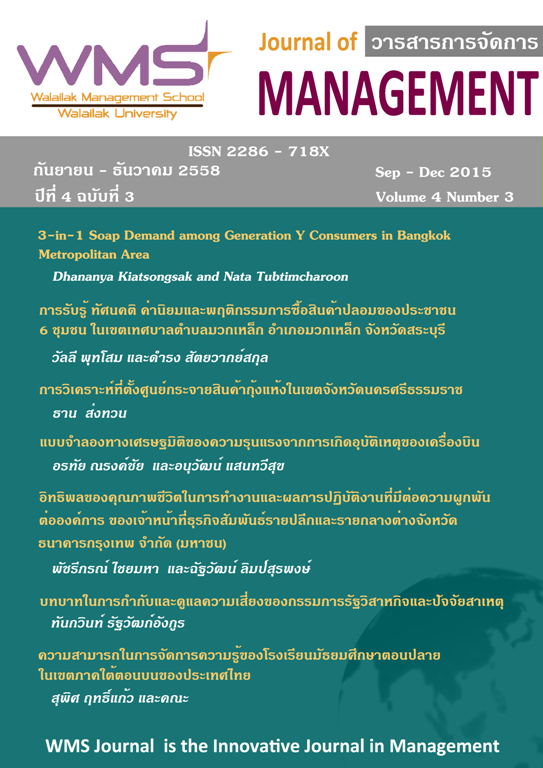Knowledge Management Capacity of High Schools in the upper South of Thailand
Main Article Content
Abstract
This research aims at knowledge management capability, Factors affecting differences in the knowledge management capability, Development of the knowledge management capability and transfer of technology and knowledge from research to develop and enhance the knowledge of high school in the Upper South. Efficient and more effective. Questionnaires were used to collect data to analyze the knowledge management environment and the Focus Group with school administrators to develop a model for the development of knowledge management of the school.
The results showed that knowledge management capability of school is high level. It also found that the number of support or organize a training course in mathematics. The size of the school, only to influence the ability of learning the school administrators that results from this development. Can help the management in the knowledge management of learners more effective. The idea is to bring the results of such research to improve the implementation of knowledge management of the school as well.Article Details
References
กระทรวงศึกษาธิการ. 2546. พระราชบัญญัติการศึกษาแห่งชาติ พ.ศ. 2542 และแก้ไขเพิ่มเติม (ฉบับที่ 2) พ.ศ. 2545. กรุงเทพฯ: กระทรวงศึกษาธิการ.
ชัชวาล วงษ์ประเสริฐ. 2548. การจัดการความรู้ในองค์การธุรกิจ. กรุงเทพฯ: เอ็กเปอร์เน็ท.
ทิพวรรณ หล่อสุวรรณรัตน์. 2547. การจัดการความรู้ในองค์การธุรกิจ. พิมพ์ครั้งที่ 1. กรุงเทพฯ: ธรกมลการพิมพ์.
พันธุ์อาจ ชัยรัตน์. 2547. บทนำเบื้องต้นของการจัดการนวัตกรรม การจัดการนวัตกรรมสำหรับผู้บริหาร. กรุงเทพฯ: สำนักงานนวัตกรรมแห่งชาติ กระทรวงวิทยาศาสตร์และเทคโนโลยี.
วิจารณ์ พานิช. 2546. ยุทธศาสตร์การจัดการความรู้. สืบค้นเมื่อ 26 ธันวาคม2546, สืบค้นจาก http://kmi.or.th.
สมนึก เอื้อจิระพงษ์พันธ์. 2553. การจัดการความรู้และนวัตกรรม. กรุงเทพฯ: ศูนย์หนังสือมหาวิทยาลัยวลัยลักษณ์.
Alavi, M. & Leidner, D.E. 2001. Review: Knowledge Management and Knowledge Management Systems: Conceptual Foundations and Research Issues. MIS Quarterly. 25(1). 107-136.
Alexander, P.A., Schallert, D.L. & Hare, V.C. 1991. Coming to terms: How Researchers in Learning and Literacy talk about Knowledge. Review of Educational Research. 61(3). 315-343.
Argyris, C. 1998. Manager, workers, and organizations. Society. 35(2). 343-346.
Brown, J.S. & Duguid, P. 2000. Balancing Act: How to Capture Knowledge without Killing it. Harvard Business Review. 78(3). 73-84.
Carrillo,J.E. & Gaimon, C. 2004. Managing Knowledge-Based Resource Capabilities Under Uncertainty. Management Science. 50(11). 1504-1518.
Chuang, S.H. 2004. A Resource-Based Perspective on Knowledge Management Capability and Competitive Advantage: an empirical investigation. Expert Systems with Applications. 27(3). 459-465.
Collison, C. & Parcell, G. 2004. Learning to Fly: Practical Knowledge Management from some of the world’s leading learning Organization. 2nd Ed. West Sussex: Capstone.
Darroch, J. & McNaughton, R. 2002. Examining the Link Between Knowledge Management Practices and Types of Innovation. Journal of Intellectual Capital. 3(3). 210-222.
Davenport, T.H. et al. 1998. Successful Knowledge Management Projects. Sloan Management Review. 39(2). 43-57.
Freeze, R.D. 2006. Relating Knowledge Management Capability to Organizational Outcomes. Ph.D.Dissertation. Arizona State University.
Gold, A.H., Malhotra,A. & Segars, A.H. 2001. Knowledge Management: an Organizational Capabilities perspective. Journal of Management Information Systems. 18(1). 185-214.
Hansen, M.T., Nohria, N. & Tierney, T. 1999. What’s Your Strategy for Managing Knowledge?. Harvard Business Review. 77(2). 106-116.
Jone,N.B., Herschel, R.T. & Moesel, D.D. 2003. Using Knowledge Champions to Facilitate Knowledge Management. Journal of Knowledge Management. 7(1). 49-63.
Mata, F.J., Fuerst, W.L. & Barney, J.B. 1995. Information Technology and Sustained Competitive Advantage: A Resource-Based Analysis. MIS Quarterly. 19(4). 478-505.
Nonaka, I. & Takeuchi, H. 1995. The Knowledge-Creating Company: How Japanese Companies Create the Dynamics of Innovation. Oxford University Press.
O’Dell, C. & Grayson, C.J. 1998. If Only We Knew What We Knew : The Transfer of Internal Knowledge and Best Practice. New York : The Free Press.
Parlby, D. & Taylor, R. 2000. The Power of Knowledge : A Business Guide to Knowledge Management. Retrieved Aug, 21, 2000. From http://www. kpmgconsulting.com/index.html.
Pena,I. 2002. Knowledge Networks as part of an integrated Knowledge Management Approach. Journal of Knowledge Management. 6(5). 469-478.
Schein, E.H. 2004. Organizational culture and leadership. 3rd Ed. San Francisco: Jossey-Bass.
Senge, Peter M. 1990. The Fifth Discipline: The Art and Practice of the Learning Organization. New York : Dounbleday-Currency.
Wade, M. & Hulland, J. 2004. Review: The Resource-Based View and Information Systems Research: Review, Extension, and Suggestions for Future Research. MIS Quarterly. 28(1). 107-142.
Yang, Chyan & Chen, Liang-Chu. 2007. Can Organizational Knowledge Capabilities Affect Knowledge Sharing Behavior?. Journal of Information Science. 33(1). 95-109


